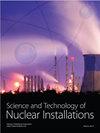An Improved Steady-State and Transient Analysis of the RSG-GAS Reactor Core under RIA Conditions Using MTR-DYN and EUREKA-2/RR Codes
IF 1
4区 工程技术
Q3 NUCLEAR SCIENCE & TECHNOLOGY
引用次数: 0
Abstract
Steady-state and transient analysis of reactor core under Reactivity-Initiated Accident (RIA) conditions are important for reactor operation safety. The reactor dynamics are influenced by neutronic and thermal-hydraulic aspects of the core. In this study, steady-state and transient analysis under RIA conditions of the RSG-GAS multipurpose reactor was carried out using MTR-DYN and EUREKA-2/RR programs. Neutronic calculations were performed using a few group cross-sections generated by Serpent 2 with the latest cross-section data ENDF/B-VIII.0. Steady-state conditions were carried out with a nominal power of 30 MW, while transient under RIA conditions occurred because the control rod was pulled too quickly while the reactor operated. These transient RIA conditions were performed for two cases, during start-up with an initial power of 1 W, and within power range with an initial power of 1 MW. Thermal-hydraulic parameters considered in this study are reactor power, the temperature of the fuel, cladding, and coolant. The calculated maximum fuel temperature at a steady state is 126.02°C. Meanwhile, the calculated maximum fuel temperature during RIA conditions at the initial power of 1 W and 1 MW are 64.38°C and 137.14°C, respectively. There are no significant differences in thermal-hydraulic parameters between each used program. The thermal-hydraulic parameters such as the maximum temperature of the coolant, cladding, and fuel under this postulated RIA condition are within the acceptable reactor operation safety limits.改进的基于MTR-DYN和EUREKA-2/RR程序的RSG-GAS堆芯RIA工况稳态和瞬态分析
反应堆堆芯在反应性引发事故(RIA)条件下的稳态和瞬态分析对反应堆运行安全具有重要意义。反应堆动力学受到堆芯中子和热工水力学方面的影响。在本研究中,使用MTR-DYN和EUREKA-2/RR程序对RSG-GAS多用途反应堆在RIA条件下的稳态和瞬态进行了分析。Neutronic计算是使用Serpent 2生成的几个组横截面和最新的横截面数据ENDF/B-VIII.0进行的。在额定功率为30的情况下进行稳态条件 MW,而在RIA条件下发生瞬态是因为在反应堆运行时控制棒拉得太快。在初始功率为1的启动过程中,对两种情况进行了这些瞬态RIA条件 W、 并且在初始功率为1的功率范围内 MW。本研究中考虑的热工水力参数包括反应堆功率、燃料温度、包壳和冷却剂。稳态下计算的最高燃料温度为126.02°C。同时,在初始功率为1的RIA条件下计算的最大燃料温度 W和1 MW分别为64.38°C和137.14°C。每个使用的程序之间的热工水力参数没有显著差异。在这种假定的RIA条件下,冷却剂、包壳和燃料的最高温度等热工水力学参数在可接受的反应堆运行安全限值范围内。
本文章由计算机程序翻译,如有差异,请以英文原文为准。
求助全文
约1分钟内获得全文
求助全文
来源期刊

Science and Technology of Nuclear Installations
NUCLEAR SCIENCE & TECHNOLOGY-
CiteScore
2.30
自引率
9.10%
发文量
51
审稿时长
4-8 weeks
期刊介绍:
Science and Technology of Nuclear Installations is an international scientific journal that aims to make available knowledge on issues related to the nuclear industry and to promote development in the area of nuclear sciences and technologies. The endeavor associated with the establishment and the growth of the journal is expected to lend support to the renaissance of nuclear technology in the world and especially in those countries where nuclear programs have not yet been developed.
 求助内容:
求助内容: 应助结果提醒方式:
应助结果提醒方式:


